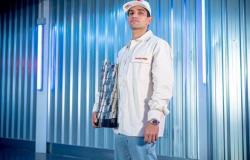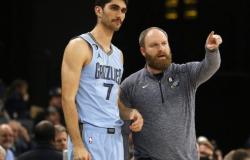David Reinbacher is going through a delicate period.
Recruited for his maturity and his potential to become a defensive pillar, he today finds himself stuck in a gray area.
His left knee injury, suffered in pre-season matches, keeps him away from the ice, but also, it seems, from his teammates.
An article by Arpon Basu in The Athletic recently highlighted this situation.
Basu relates a telling anecdote shared by Kaiden Guhle, which illustrates the disconnect between Reinbacher and the rest of the team.
At the Canadiens’ Halloween party, the young defenseman didn’t know if he was invited or if he had to stay home.
“He didn’t know whether or not to come to our Halloween party, and we told him, ‘You’re coming. You must be there,” Guhle said.
This kind of doubt, although seemingly innocuous, reflects a larger problem.
Reinbacher, at only 20 years old, is in the midst of his development, and his integration into the team is crucial, especially in the absence of on-ice activity.
When we hear this kind of talk about a young player – hesitant, withdrawn and unsure of his place in the group – it is natural to assume that those close to him must find this situation worrying.
Whether it’s his family, his friends or his mentors, seeing David in this state, isolated and without a clear role, must raise legitimate concerns.
His constant smile, mentioned by Guhle, may well be hiding deeper doubts.
For a young talent like Reinbacher, the feeling of belonging is essential.
However, this type of situation highlights a potentially dangerous gap in its development.
When a player begins to doubt their role on a team, it can undermine their confidence and jeopardize their progress.
For Canadians, this situation should be a wake-up call.
The integration of a hopeful like Reinbacher cannot be left to chance or the good will of a few teammates.
It is essential that he feels supported and included.
Reinbacher was drafted to become a key player in the Canadiens’ future.
But to reach this potential, he will have to feel at home in this organization.
Canadians must take steps to ensure that its role, even in rehabilitation, is clear and rewarding.
For those close to him, hearing that David is in this gray area, with no real sense of belonging, must be heartbreaking.
This kind of detachment not only reflects a difficult time on a physical level, but also mental fragility.
David Reinbacher needs more than medical rehabilitation. He needs a structure that allows him to flourish, to feel integrated and ready to return to the ice with complete confidence.
Without it, the Canadiens risk losing much more than a hope: they could undermine the future of a player who, under other circumstances, could have become a pillar.
Misery …





